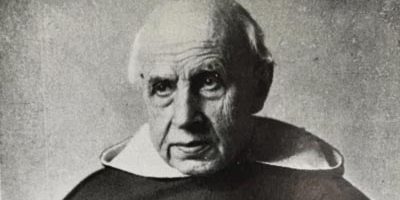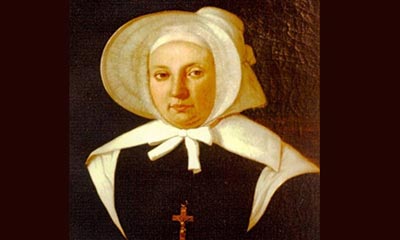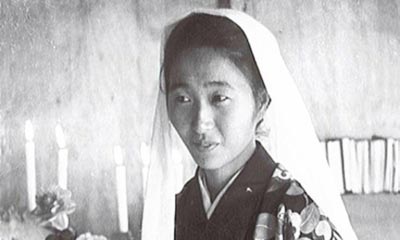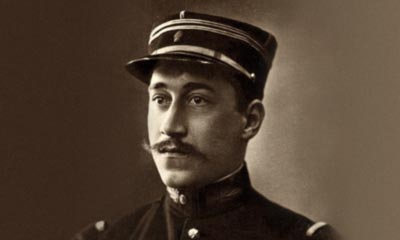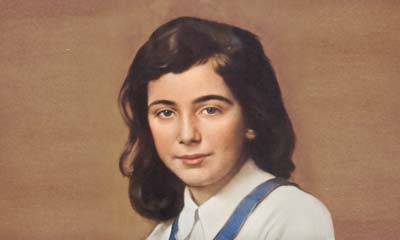September 29, 2022
Blessed Hyacinth Cormier
Dear Friends,
“In Father Cormier”, said Saint John Paul II, “the Church wishes to recognize and honor the action of the human intellect, when enlightened by faith. The founder of the Angelicum University (in Rome) reminds us, in fact, that God calls on us to use the faculties of our spirit, which is a reflection of His own, to give Him glory. He was a man athirst for the truth, but he was also able to give the gift of self to his brothers as Prior, as Provincial and as Master General of the Dominican Order, respecting its centuries-old traditions. He guided the sons of St Dominic with his wisdom and competence in order to lead them to God, to make them authentic sons and witnesses of the Kingdom” (Homily for the Mass of Beatification, November 20, 1994).
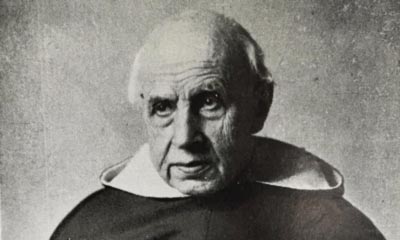 Henri Cormier was born in Orléans, France, on December 8, 1832, feast of the Immaculate Conception; he would always have a great devotion to the Blessed Virgin. His father, who owned a grocery store, found great pleasure in music, and his two sons were to inherit his taste for art; however, he died only a few years after Henri’s birth. Mrs. Félicité Cormier therefore took care of the two boys’ education alone. Above all, Henri loved prayer, the Rosary in particular, and also to serve Mass. His first Communion left a fond and lasting impression on him. He did well at school but was rather lazy. He entered the minor seminary of La Chapelle-Saint-Mesmin (near Orléans) in 1846, and experimented with all kinds of musical instruments before choosing the organ. Gifted with a very beautiful voice, he always hid and could not be found when people wanted to congratulate him for his solo performances. He also painted, and was especially fond of rural landscapes. “I paint for eternity” was one of his favorite sayings. Henri received a literature prize from the Academy of Orléans.
Henri Cormier was born in Orléans, France, on December 8, 1832, feast of the Immaculate Conception; he would always have a great devotion to the Blessed Virgin. His father, who owned a grocery store, found great pleasure in music, and his two sons were to inherit his taste for art; however, he died only a few years after Henri’s birth. Mrs. Félicité Cormier therefore took care of the two boys’ education alone. Above all, Henri loved prayer, the Rosary in particular, and also to serve Mass. His first Communion left a fond and lasting impression on him. He did well at school but was rather lazy. He entered the minor seminary of La Chapelle-Saint-Mesmin (near Orléans) in 1846, and experimented with all kinds of musical instruments before choosing the organ. Gifted with a very beautiful voice, he always hid and could not be found when people wanted to congratulate him for his solo performances. He also painted, and was especially fond of rural landscapes. “I paint for eternity” was one of his favorite sayings. Henri received a literature prize from the Academy of Orléans.
Ungrateful for too long
His elder brother, Eugène, a seminarian, died in 1847. From that moment, Henri had a more profound understanding of the meaning of life and death in relation to eternity. His great sensitivity caused him much suffering, but his quest for beauty turned him towards the splendor of eternal life. Every week, Mrs. Cormier would travel the ten kilometers from her home to the minor seminary to enquire about Henri’s health and work. When he finished school, he entered the major seminary in Orléans, where he acquired a deep love of discipline. These words were found in his first-year retreat notes: “I am filled with the need to give myself entirely to God… I have been ungrateful for too long…” He found great pleasure in the study of philosophy, and later of theology, but piety remained his chief priority. Attracted by the desire to preach the Gospel, and also because of his devotion to the Rosary which he recited every day, he was received into the Third Order of Saint Dominic. In order to live in greater poverty at the service of the poor Christ, he deprived himself of the small comforts of home.
Saint John Paul II noted: “The history of the Rosary shows how this prayer was used in particular by the Dominicans at a difficult time for the Church due to the spread of heresy. Today we are facing new challenges. Why should we not once more have recourse to the Rosary, with the same faith as those who have gone before us? The Rosary retains all its power and continues to be a valuable pastoral resource for every good evangelizer” (Apostolic Letter, Rosarium Virginis Mariæ, October 16, 2002, no. 17).
Encouraged by the new bishop of Orléans, Bishop Dupanloup, the young seminarian devoted a lot of time and energy to the teaching of Christian doctrine and the catechism.
The Compendium of the Catechism of the Catholic Church stresses the importance of catechesis: “The lay faithful participate in the prophetic office by welcoming evermore in faith the Word of Christ and proclaiming it to the world by the witness of their lives, their words, their evangelizing action, and by catechesis. This evangelizing action acquires a particular efficacy because it is accomplished in the ordinary circumstances of the world” (no. 190).
During the holidays, Henri used to relax with his family but forgot neither piety nor his studies. Shortly after receiving his first minor orders, he took a vow of chastity. Well aware of the gifts that God had given him, Henri made the resolution to remain humble: “I will have great distrust of myself… I will put my trust only in God… What I must strive for is to become a man of prayer.”
Zero vocation
Henri was particularly attracted by the figure of Saint Dominic, and so he went to meet Father Lacordaire, the restorer of the Dominicans in France. He emerged from this meeting rather disheartened: “Zero vocation, or not mature”, the religious told him. However, another Brother of the Order judged him differently, and rekindled in him the ideal of a religious life. On May 17, 1856, Henri was ordained a priest for the diocese of Orléans by Bishop Dupanloup, with a dispensation because of his age. His resolve to join the Friars Preachers remained intact, nevertheless. With the support of the director of the seminary, he obtained permission to leave the diocese. At the close of his first Mass, he announced to his mother that he would soon be leaving. This caused her great sorrow.
The Order of Preachers, founded in the early thirteenth century by St. Dominic, grew rapidly and by the end of the century had more than 400 priories and some 15 000 religious. In France, it was annihilated by the Revolution of 1789. In 1839, a French priest, Father Lacordaire, entered the Roman novitiate of the Order, and in 1843, he founded the first restored Dominican convent in Nancy, despite strong opposition from the civil authorities and certain currents within the French episcopate. In 1850, the French province of the Order was restored.
Father Cormier entered the Dominican novitiate in Flavigny-sur-Ozerain and together with the habit, received the name of Brother Hyacinthe, to which he later added that of Mary. His gentleness won him hearts. Among the novices, serving his Mass was viewed as a privilege. Of these happy times, he would later say: “I only suffered because I did not suffer.” He acquired a robust Dominican spirit under the guidance of his successive novice masters. During his free time, when he was not praying the rosary, he read either the Rule (of Saint Augustine) or the Constitutions. Although he was attentive to the letter of obedience, he sought above all its spirit: “We must ask God, with tears and groaning, for the Spirit who gives life from within.”
“Life in the Spirit is clearly of primary importance. Living in the Spirit, consecrated persons discover their own identity and find profound peace; they grow more attentive to the daily challenges of the word of God, and they allow themselves to be guided by the original inspiration of their Institute. Under the action of the Spirit, they resolutely keep times for prayer, silence and solitude, and they never cease to ask the Almighty for the gift of wisdom in the struggles of everyday life”, Saint John Paul II recalled in his Exhortation Vita Consecrata (March 25, 1996, no. 71).
However, the young friar suffered from hemoptysis (coughing up blood), and his state of health called his vocation into question. His superiors had doubts regarding his ability to make his profession as a Dominican. This ordeal was further complicated by the intervention of his mother, who urged him to leave the religious habit in order to resume his ministry as a diocesan priest. Notwithstanding, the novice continued to trust in God and turned to the intercession of Mary: “I abandon myself to the Blessed Virgin; I abandon my health to her. She took care of Jesus Christ’s health; she will take care of mine… Yes, Lord, do with my being whatsoever you desire.” On June 29, 1857, Father Hyacinthe was admitted to profession for two years only, while the other novices took their perpetual vows.
An amiable and vigorous interior life
During a visit to Flavigny, Father Jandel, who was Master General of the Order at the time, was impressed by Father Cormier’s fervor and by the novice master’s very favorable report about him. He decided to take him to Rome, where the mild climate would be beneficial to his health, and to make him his secretary. The intention of the Father General was to re-establish the Order in its primitive discipline, with long periods of prayer and communal life. In this, he was opposed to Father Lacordaire, who above all wished to stimulate the brothers’ studies and apostolate. To achieve his goal, Father Jandel decided to make a synthesis of the Constitutions, many of whose prescriptions were no longer practicable. Father Hyacinthe’s task consisted in exploring the ancient documents of the Order in order to restore the essence of its observances; in so doing, he acquired a profound knowledge of the Dominican spirit. For his brothers, he desired an “enlightened, amiable and vigorous interior life. This life is to result from our observances which God’s wisdom has arranged for this purpose.” He never asked for dispensations for himself, despite his poor health.
But by the end of his two years of temporary vows, the hemorrhages had returned, making the perspective of perpetual profession more uncertain than ever. At the same time, his mother, who had travelled alone from Orléans to Rome, tried for the last time to turn him away from the religious life; overcome by her son’s determination and touched by grace, however, she finally accepted his vocation. Blessed Pope Pius IX granted Father Hyacinthe permission to pronounce his perpetual vows, provided that the symptoms of his illness disappear for thirty days. After twenty-nine days, Father Hyacinthe suffered a new hemorrhage. Father Jandel then interceded with the Pope, who authorized the profession. The ceremony took place on May 23, 1859, in Santa Sabina, which is a church of the Dominicans in Rome. To everyone’s surprise, the Father, who seemed to be on the verge of death, gradually recovered. After a time of rest, he was appointed sub-master of novices.
Two years later, Father Hyacinthe left for Corsica, where he was appointed master of the new novitiate in Corbara. His relations with the prior of the house proved to be somewhat awkward: instead of opting for training based on patience and observance of the Rule, the latter wanted to obtain immediate results. Father Hyacinthe offered his resignation to the Master General, who refused it and sent him the following advice: “In the midst of all these storms, do not lose courage, but keep your peace and trust in God. Keep yourself united to Our Lord. These moments of trial are the promise of many a consolation.” In 1863, Father Hyacinthe became the prior of the convent of Corbara, which would long bear the mark of the impetus he gave it. He noted in his diary: “May the excellence of the Brothers’ reputation spring from the poverty and mortification of their cloistered life, as well as from their gracious charity for all!” In 1865, Father Cormier was appointed provincial of the recently restored province of Toulouse, the cradle of the Order; he exercised this responsibility until 1874; then from 1874 to 1891, he exercised, in turn and in different places, the functions of conventual prior or provincial.
Kindling the good spirit
In 1891, a General Chapter was held in Lyons: Father Hyacinthe was elected Diffinitor of the Order (the Diffinitor represents his province at the General Chapter and in Rome). The new Master General, Father Früwirth, called him to his side. Their widely differing temperaments sometimes clashed, but Father Hyacinthe showed his spirit of faith in the small incidents of each day: “A day without sacrifice”, he said, “is like a country without a church; everything is material and sad.” Soon afterwards, he was given the office of procurator, which rose him to the second rank of the Order. The procurator deals with the affairs of the Order in its relations with ecclesiastical and civil institutions. Father Hyacinth was also a consultant to various congregations of the Curia, and Popes Leo XIII and later St. Pius X entrusted him with several delicate missions. Whatever his duties, he sought above all the spiritual realities: “It is true that when it comes to dealing with these affairs, I can always find a way to kindle the good spirit…” In 1899, Pope Leo XIII wanted to make him a cardinal, but the hostility of the French government towards religious communities forced him to drop the idea.
On May 21, 1904, during a General Chapter, Father Hyacinthe was elected Master General of the Order. Despite now being seventy-two years old, he accepted this office, which he held until 1916, in a supernatural spirit. On hearing the news, Pope St. Pius X expressed his delight: “He is a saint… I rejoice greatly!” Before the election, he had ordered Father Hyacinthe: “If there is any question of some office for you, you shall bow your head in acceptance!” The new General’s aim was to promote in the convents a strong spiritual life based on the observance of the Rule and the Constitutions, that must take precedence over higher studies without suppressing them. In his first circular letter, he set out his aims: “To make the same spirit of prayer, humility, obedience, poverty, self-denial, piety for one’s neighbor and zeal for the integrity of the faith, which animated our holy patriarch Dominic, flourish again in the whole Order, in convents as well as in individuals, and to spread it further afield.” It was in this spirit that Father Hyacinthe, despite his age, undertook to visit all the convents of the Order, in a political context of persecution of the Church which imposed very difficult living conditions on the religious. In 1903, the French Dominicans were expelled from their convents; they had to seek refuge in other countries.
“You will have to obey!”
Father Hyacinthe’s health remained poor, but he wrote: “Thanks be to God, my health is fairly good. By following my habits and my diet at home, I can work all day.” He did his best not to let his moments of tiredness show; when he travelled, he refused any kind of comfort, even when his assistants begged him to take it easy. Speaking of him, the Holy Father quipped: “These good saints, they come to ask us to beatify them, but they do not know how to obey…” At the end of a private audience, St. Pius X declared in a friendly manner to Brother Damiano, who was in charge of assisting Father Hyacinth: “You must look after him. If you don’t treat him well, I will excommunicate you! You are the picture of health, but look how thin this poor old man is.” He added, for the benefit of Father Hyacinthe: “You will have to obey Brother Damiano from now on!” Father Hyacinthe submitted to the Pope’s demand until he died. His frailness and humility led him to believe that he should resign, but both his entourage and the Pope himself objected.
Father Cormier’s generalate coincided with the troubled era of modernism. He was led to defend his religious, particularly Father Lagrange, who was accused of infidelity to Catholic doctrine in his exegesis, but not without asking him to tone down his assertions. His desire was that “the Order should remain faithful to its traditions of ardent search for the truth in complete submission to the Holy See”. He promulgated a new ratio studiorum (organization of studies) for the Order, and played an important role in restructuring the College of Saint Thomas in Rome, commonly known as the Angelicum. In accordance with the views of Pope Leo XIII, he fostered fidelity to Thomistic philosophy and theology. Father Cormier gave the Angelicum its own motto as Master General: Caritas veritatis (the charity of truth). He also contributed to the establishment of the universities of Fribourg, Jerusalem and Louvain. Likewise, he revived the Dominican Third Order, and restored or established new Dominican provinces throughout the world. However, the Father’s main concern remained the novitiates. The tensions between Church and State, especially in France and Italy, and then the First World War, during which so many religious were called up to serve in the army (usually as chaplains or stretcher-bearers), caused him great suffering. On Holy Thursday of 1916, shortly before leaving office, he gave an address at the Roman University on the theme of the intimate life with Jesus: it is considered as his spiritual testament to teachers and students. In it he emphasized the primacy of the interior life and union with the Savior.
Too strong a remedy
Father Hyacinthe had a magnanimous inclination not to believe in wickedness, and he often fell victim to this generous incredulity. Some people complained that he was not forceful enough in dealing with certain situations, but he would reply: “Too strong a remedy could destroy not the evil, but the patient.” When he imposed sanctions, they were dictated by wisdom and charity. In his humility, he maintained that “it is enough to use in conscience the means available to us, and God will do the rest, allowing even our weaknesses to play a part”.
“If we are constantly upset and impatient with others”, writes Pope Francis, “we will end up drained and weary. But if we regard the faults and limitations of others with tenderness and meekness, without an air of superiority, we can actually help them and stop wasting our energy on useless complaining. Saint Thérèse of Lisieux tells us that ‘perfect charity consists in putting up with others’ mistakes, and not being scandalized by their faults’. Paul speaks of meekness as one of the fruits of the Holy Spirit (cf. Gal 5, 23). He suggests that, if a wrongful action of one of our brothers or sisters troubles us, we should try to correct them, but with a spirit of meekness, since you too could be tempted (Gal 6, 1) (ibid.) ‘Reacting with meekness and humility: that is holiness.’” (Apostolic Exhortation Gaudete et exsultate, March 19, 2018, nos. 72-74).
At the end of his generalate in 1916, Father Hyacinthe retired to the convent adjoining the Basilica of St. Clement in Rome. Long afterwards, the religious there still remembered his long hours of prayer. As a young Dominican, Father Hyacinthe used to say: “When I can no longer devote myself to external works, when it is impossible for me to preach, to teach, or even to chant, I will still say the Rosary; and if I can no longer do so, I will still hold it in my hands or before my eyes. It will be, in various forms, my patience for suffering, my preparation for dying.” He recited two complete Rosaries every day, one for the Church and the Pope, the other for the Dominican Order and other intentions. He continued to celebrate Mass daily. Despite his desire to hide the supernatural favors with which he was graced, he was on several occasions seen in ecstasy or levitation. He sometimes complained that he was being over-cared for: “My retreat in this house is intended to help me die well. But it seems to be designed to prevent me from dying, so carefully organized is it, and I am attended to with care…” The decline in his health began to accelerate in November. He suffered serenely, saying, “My God, take me!”, and: “I told the Good Lord to make haste, but He does not want to!” On December 17, marking the seventh centenary of the approval of the Dominican Order, he renewed his vows in the presence of the Master of the Order and the community, joined in the singing of the Salve Regina and died peacefully. His last gesture was that which priests make when saying Dominus vobiscum, as if to entrust to the Lord all those present. His body lies beneath the altar of the church of the Angelicum.
Saint John Paul II said that Father Cormier “never ceased to live by the truth, and he shared it with all his Dominican brothers with perseverance and humility. Had he not associated truth with charity in his motto: Caritas veritatis? Indeed, he often said that to give the truth is ‘the most beautiful kind of charity’” (November 20, 1994). Let us ask Our Lady of the Rosary for the grace to be witnesses of Christ who is the Truth, by way of our own life and by loving our neighbor.


